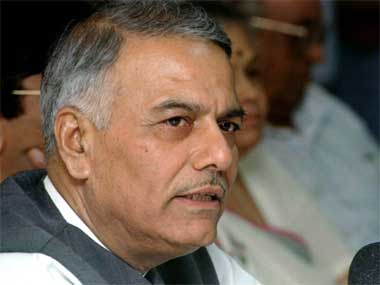During his term as finance minister under two vastly different prime ministers, Yashwant Sinha ushered in many bold reform measures. And although he was compelled by political circumstances to roll back several of his bold measures - thus earning him the unfortunate sobriquet of ‘Rollback’ Sinha - his reputation as a gutsy institutional reformer is well-earned.
But after yesterday’s speech in Parliament , in which he quoted Oliver Cromwell to beseech the government to “go - in the name of god” if it couldn’t tackle high inflation, one must wonder if Sinha is drawing up his CV for appointment to Sonia Gandhi’s kitchen cabinet, otherwise known as the National Advisory Council (NAC).
Sinha’s criticism of the government for its failure to tame inflation is of course merited, but the tenor of his speech otherwise resembled the knee-jerk responses of the busybodies at the NAC rather than the “swadeshi reformer” that he claims to be.
This gives cause to wonder why politicians change their stripes and their tunes between the time when they are in power and when they are in Opposition. The answer may lie in an interesting anecdote that BJP ideologue and former disinvestment minister Arun Shourie used famously to narrate: at its core it describes the perverse and adversarial nature of politics in India.
[caption id=“attachment_53887” align=“alignleft” width=“380” caption=“The tenor of Yashwant Sinha’s speech resembled the knee-jerk responses of the busybodies at the NAC rather than the “swadeshi reformer” that he claims to be. Savita Kirloskar/Reuters”]
 [/caption]
[/caption]
Once, when the BJP-led NDA was in power, Shourie was challenged in Parliament - by the Congress, then in the Opposition - to give his views on the kind of labour reforms that were required in India. When he began detailing the changes needed, Congress MPs repeatedly heckled him - “till I disclosed that I was only reading out the industrial policy resolution” issued by the Congress government in Maharashtra!
As was subsequently illustrated, the BJP too is not above playing such double-games. While it was in power, it introduced the Value Added Tax regime after intense negotiations with state governments. But after 2004, when it lost power at the Centre and the Congress advanced the very same VAT proposal, the BJP directed BJP-ruled states not to implement it - although it was the same proposal it had put together.
Likewise, it was customary for the Left parties to oppose at the central level pretty much the same kind of reforms they were themselves implementing at the state level.
Intellectual and political honesty comes at a premium in India, and the failing is fairly universal across the political spectrum, and Sinha’s speech yesterday, with its reflexive lurch to the left, only served to illustrate that.
This is all the more unfortunate because the space for reasoned articulation of the cause of economic reforms in India is virtually uninhabited, and Sinha, with his swadeshi touch, could have carried it off with conviction.
For instance, there’s a reasonable case to be made that inflation is being fed in large measure by the government’s profligacy on schemes such as NAREGA (as Firstpost has established here and here )
But it would have taken intellectual honesty of the highest order and political courage bordering on recklessness for Sinha to have suggested that the rural employment guarantee programme, as is currently designed and implemented, be either wound down or scaled back in the cause of fighting inflation. No politician can reasonably hope to get elected on that platform.
Perhaps that may account for why politicians change their tunes - and why all reforms in India must perforce happen by stealth. But while a speech such as Sinha’s, with all its populist claptrap, may momentarily make for good politics, it contributes to the downward spiral of rank bad economics. Perhaps he should, on closer reflection, roll back some aspects of his speech.
Venky Vembu attained his first Fifteen Minutes of Fame in 1984, on the threshold of his career, when paparazzi pictures of him with Maneka Gandhi were splashed in the world media under the mischievous tag ‘International Affairs’. But that’s a story he’s saving up for his memoirs… Over 25 years, Venky worked in The Indian Express, Frontline newsmagazine, Outlook Money and DNA, before joining FirstPost ahead of its launch. Additionally, he has been published, at various times, in, among other publications, The Times of India, Hindustan Times, Outlook, and Outlook Traveller.
)